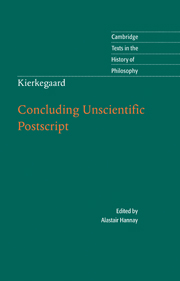Book contents
- Frontmatter
- Contents
- Introduction
- Chronology
- Further reading
- Note on the translation
- CONCLUDING UNSCIENTIFIC POSTSCRIPT TO THE PHILOSOPHICAL CRUMBS
- Preface
- Contents
- Introduction
- Part One The objective problem of Christianity's truth
- Part Two The subjective problem. The subject's relation to the truth of Christianity, or what it is to become a Christian
- 5 Conclusion
- Appendix: Understanding with the reader
- A first and last declaration by S. Kierkegaard
- Index
- Cambridge Texts in the History of Philosophy
Appendix: Understanding with the reader
Published online by Cambridge University Press: 26 February 2010
- Frontmatter
- Contents
- Introduction
- Chronology
- Further reading
- Note on the translation
- CONCLUDING UNSCIENTIFIC POSTSCRIPT TO THE PHILOSOPHICAL CRUMBS
- Preface
- Contents
- Introduction
- Part One The objective problem of Christianity's truth
- Part Two The subjective problem. The subject's relation to the truth of Christianity, or what it is to become a Christian
- 5 Conclusion
- Appendix: Understanding with the reader
- A first and last declaration by S. Kierkegaard
- Index
- Cambridge Texts in the History of Philosophy
Summary
The undersigned, Johannes Climacus, who has written this work, does not make himself out to be a Christian; for he is completely preoccupied with how difficult it must be to become one; but still less is he one who, having been a Christian, ceases to be that by going further. He is a humorist. Content with the conditions of the moment, hoping that something higher may be granted him, he feels himself singularly fortunate, things having come to this pass, to be born precisely in this speculative, theocentric century. Yes, ours is an age of speculators and great men with matchless discoveries; and yet I believe that none of these honourable gentlemen is as well off as a privately practising humorist in all his quietude, whether on his own he beats his breast or roars with laughter. He can therefore very well be an author, if only he takes care that it is only for his own enjoyment, that he keeps to himself, does not get caught up in the crowd, perish in the importance of the age, be assigned to the pump like an inquisitive spectator at a fire, or merely be embarrassed by the thought that he might stand in the way of any of the various distinguished gentlemen who are and shall be and must be, and insist on being, important.
- Type
- Chapter
- Information
- Kierkegaard: Concluding Unscientific Postscript , pp. 520 - 526Publisher: Cambridge University PressPrint publication year: 2009

